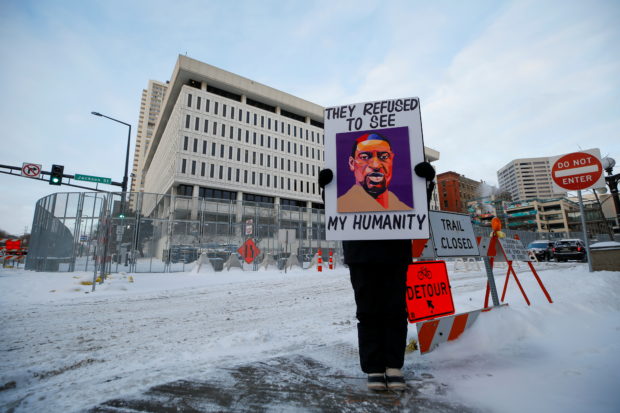Three Minneapolis ex-police officers guilty of violating George Floyd’s rights

A protestor stands outside of the Warren E. Burger Federal Building and U.S. Courthouse before opening arguments of the civil trial of three former Minneapolis police officers, Tou Thao, J. Alexander Kueng, and Thomas Lane, charged with violating George Floyd’s civil rights when they took part in his deadly arrest in St. Paul, Minnesota, U.S., January 24, 2022. REUTERS/Eric Miller
ST. PAUL, Minneapolis — Three former Minneapolis police officers were found guilty by a federal jury on Thursday of depriving George Floyd of his civil rights by failing to give aid to the handcuffed Black man pinned beneath a colleague’s knee.
The jury also found that the conduct of officers Tou Thao, 36; J. Alexander Kueng, 28; and Thomas Lane, 38, during the arrest on May 25, 2020, caused Floyd’s death, a finding that can affect the severity of their sentence.
It is a rare instance of police officers being held criminally responsible for a colleague’s excessive force. All three men were convicted of denying Floyd’s constitutional right to medical care while in police custody.
Thao and Kueng were also convicted on a charge of denying Floyd’s right to not face excessive force by failing to stop their colleague Derek Chauvin from kneeling on Floyd’s neck for more than nine minutes. Chauvin was convicted last year in a state court of Floyd’s murder.
Thao, Kueng, and Lane will remain free on bail pending their sentencing hearing, which has yet to be scheduled. Prosecutors have not yet said what sentence they will request, but the men may face years in prison.
Article continues after this advertisement“This is just accountability,” Philonise Floyd told reporters after the verdict was read. “It could never be justice because I can never get my brother back.”
Article continues after this advertisementThe verdict marked a second victory this week for prosecutors in the U.S. Department of Justice’s Civil Rights Division, coming just two days after a jury in Georgia found three white men guilty of federal hate crimes in the murder of Ahmaud Arbery, a young Black man who was gunned down while running through a mostly white neighborhood.
“That’s historic for our country because oftentimes officers kill Black and brown men and women, and we get little to no consequences,” said Brandon Williams, George Floyd’s nephew. “A lot of times we don’t even get charges, let alone convictions.”
Killing sparked protest
Federal prosecutors argued in the U.S. District Court in St. Paul that the men knew from their training and from “basic human decency” that they had a duty to help Floyd as he begged for his life before falling limp beneath Chauvin’s knee.
Floyd’s killing sparked protests in cities around the world against police brutality and racism.
It also led lawmakers to propose such measures as restricting chokeholds, banning “no-knock warrants,” and legislating to curtail the U.S. Supreme Court doctrine known as “qualified immunity” that limits lawsuits over police use of excessive force.
Those proposals were included in the George Floyd Justice in Policing Act passed in the Democratic-controlled U.S. House of Representatives last year. Philonise Floyd on Thursday again urged lawmakers to pass the measure that has stalled in the Senate, where Democrats are unlikely to get the necessary Republican votes.
Chauvin, who is white, was sentenced to 22-1/2 years in prison last year after a state murder trial. Although race was not part of the state or federal charges, Chauvin’s conviction was seen as a landmark rebuke of the disproportionate use of police force against Black Americans. In December, Chauvin pleaded guilty to the federal charge of violating Floyd’s rights.
Under Chauvin’s plea agreement, federal prosecutors will seek a 25-year sentence, concurrent with his state prison sentence. His three former colleagues are also due to stand trial in Minneapolis in June on state charges of aiding and abetting Floyd’s murder.
Bystander video
A widely seen cellphone video shows Thao standing steps away from Floyd, rebuffing demands by horrified onlookers that Chauvin gets off Floyd’s neck. Kueng and Lane were to Chauvin’s right, pinning down Floyd’s buttocks and legs.
All three testified in their own defense. Each acknowledged they knew they had a duty of care to people in their custody. But they and their lawyers told jurors they did not realize at the time that Floyd was in dire need of medical aid or that Chauvin’s use of force was excessive.
Prosecutors repeatedly played videos showing Floyd’s distress was plain to bystanders, including children and an off-duty firefighter, who shouted that Floyd was passing out and begging the police to check his pulse.
The three defendants all described deferring to the authority of Chauvin, the most senior officer at the scene with 19 years at the Minneapolis Police Department.
Kueng and Lane, who first handcuffed Floyd on suspicion of using a fake $20 bill in a nearby store, also noted they were rookies only a few days out of training, which lasted more than a year. Thao had been on the force for eight years.
Medical experts have testified that Floyd almost certainly would have survived the arrest if he had been rolled onto his side once the officers restrained him, as the officers acknowledged they had been taught to do.
RELATED STORIES
Three Minneapolis ex-police officers were indifferent to George Floyd’s pleas, jury told
George Floyd recommended for posthumous pardon on drug conviction
UN rights chief calls for ‘systemic racism’ to be dismantled